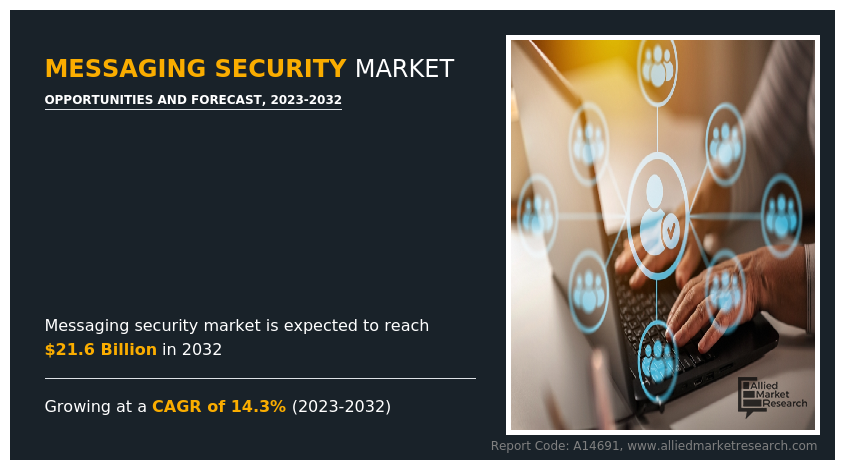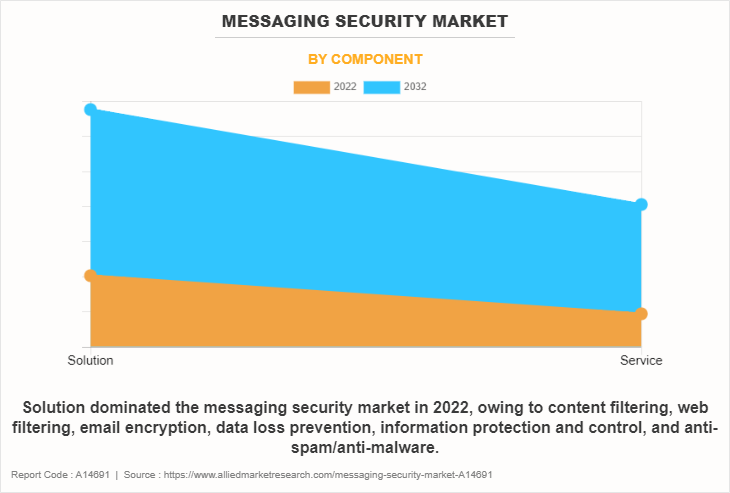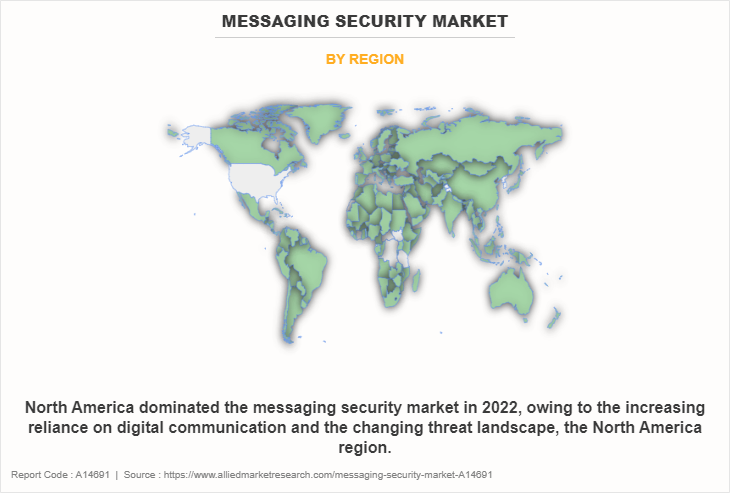Messaging Security Market Overview
The global messaging security market was valued at USD 5.9 billion in 2022, and is projected to reach USD 21.6 billion by 2032, growing at a CAGR of 14.3% from 2023 to 2032.
Factors such as rise in online threats and increase in need of rules and regulations primarily drive the growth of the market. However, rise in cost of implementation and complexity of security solutions hamper the market growth severely. Additionally, rise in adoption of cloud platform is expected to provide lucrative opportunities for messaging security market forecast.

Introduction
The messaging security market refers to the sector of the economy that is centered on offering products and services to safeguard communication channels from various online dangers. It includes a broad range of tools and techniques for ensuring the availability, confidentiality, and integrity of communications sent over various platforms, such as email, instant messaging, and collaborative software. Organizations rely heavily on messaging platforms for their daily operations in the new digital age.
However, fraudsters are increasingly focusing on various lines of communication in an effort to exploit loopholes and get unauthorized access to private data. As a result, the market has grown to become an important part of an all-encompassing cybersecurity strategy. The market offers a wide range of products and services made to deal with many different elements of message security. These include email encryption, which prevents email content from being intercepted or viewed by unauthorized parties by ensuring that only authorized receivers can access and interpret it. End-to-end encryption is offered by secure messaging software for instant messaging, ensuring the privacy and confidentiality of communications. Content filtering is a crucial component of the message security market. This necessitates scanning messages for harmful information, such as phishing emails or malware attachments, using sophisticated algorithms and machine learning approaches. By identifying and blocking potentially hazardous messages, content filtering technologies assist organizations in lowering their vulnerability to cyberattacks.
Segment Overview
The messaging security market is segmented on the basis of component, communication mode, deployment mode, end user, and region. On the basis of component, it is classified into solution and services. On the basis of communication mode, it is categorized into email and instant messaging. On the basis of deployment mode, it is segregated into on-premise and cloud. On the basis of end user, it is fragmented into BFSI, retail & e-commerce, healthcare, government and defense, media and entertainment, manufacturing, and others. Region-wise, it is analyzed across North America, Europe, Asia-Pacific, and LAMEA.

On the basis of component, solution segment dominated the messaging security market size in 2022 and is expected to maintain its dominance in the upcoming years, owing to protect messaging systems such as email, instant messaging, and social media, it necessitates a variety of security methods, such as encryption, authentication, access controls, and threat detection. However, the services segment is expected to witness the highest growth, owing ensure the effectiveness of the messaging security measures, which assist organizations in identifying vulnerabilities, creating security rules, configuring and integrating security technologies, and performing routine audits and assessments.

Region wise, the market was dominated by North America in 2022 and is expected to retain its position during the forecast period, owing to the increasing reliance on digital communication, widespread use of secure messaging services, and encrypted communication channels are significant trends and opportunities in the market in the region. However, Asia Pacific is expected to witness significant growth during the forecast period, owing to solutions that solve the particular difficulties of the Asia-Pacific region's e-commerce ecosystem, such as the integration of secure messaging with payment gateways and fraud detection systems, messaging security providers have the chance to fulfill customer requirements.
The report focuses on growth prospects, restraints, and analysis of the global market trends. The study provides Porter’s five forces analysis to understand the impact of various factors, such as bargaining power of suppliers, competitive intensity of competitors, the threat of new entrants, threat of substitutes, and bargaining power of buyers on the global messaging security market share.
Top Impacting Factors
Rise in Online Threats
The market for messaging security is expanding, owing to the growing incidence and sophistication of cyber threats. Cybercriminals are developing new strategies to take advantage of flaws and get unauthorized access to private data and communications as technology develops and communication channels become more interconnected. Organizations nowadays urgently need to invest in strong messaging security solutions to safeguard their priceless assets from online attacks. The growth of cybercrimes such as phishing and ransomware is a major factor propelling the messaging security market growth. Through email or messaging platforms, these attacks frequently target people or organizations with the goal of fooling them into disclosing personal information or yielding money. Organizations are becoming more aware of the need to secure their messaging platforms owing to the possible financial losses and reputational harm caused by such assaults. These organizations are aggressively seeking for cutting-edge message security solutions that can quickly identify and counteract risks related to phishing attacks.
Furthermore, message security systems need to be continuously improved due to the transitional nature of cyber threats. Since cybercriminals are continually changing their strategies, message security providers must keep up with the latest developments. This motivates the creation of sophisticated threat detection and prevention tools such as machine learning (ML) and artificial intelligence (AI) systems. To guarantee that their messaging systems are effectively safeguarded against new cyber threats, organizations are continually searching for these cutting-edge solutions. Rise in frequency and complexity of cyberattacks is a major driver in the market, driving up need for robust messaging security solutions.
Increase in Need of Rules and Regulations
The regulatory compliance requirement is significantly contributing in the expansion of the messaging security market. To safeguard the security and privacy of sensitive data, governments and regulatory agencies globally are enforcing stronger rules and guidelines. For instance, the General Data Protection Regulation (GDPR) in the European Union requires businesses to implement suitable security measures to safeguard personal data, including information sent over messaging platforms. Therefore, to assure compliance with these rules, this has strongly encouraged businesses to invest in message security solutions. For organizations, breaking regulatory rules can have serious repercussions, such as expensive fines, legal responsibilities, and reputational harm. Businesses are actively looking for messaging security solutions that assist them in adhering to compliance rules and safeguarding their data to avoid these threats. The market is more competitive for messaging security companies who offer comprehensive solutions that are in line with legal regulations.
In addition, to meet new risks and difficulties, regulatory compliance standards are dynamic and transitional. Governments and regulatory organizations update and establish new legislation as new cyber risks and data privacy concerns materialize. Organizations must stay updated with the most recent compliance regulations as a result of this continual evolution, and they must also invest in messaging security solutions that can alter to accommodate these changes. Thus, the need for organizations to comply with regulatory standards and ensure the protection of sensitive data communicated through messaging platforms drives the demand for messaging security.
Key Market Players
Messaging security key players such as Mcafee, Llc, Cisco Systems, Inc., Trend Micro Incorporated, Microsoft Corporation, Broadcom, Proofpoint, Inc., Sophos Ltd., Barracuda Networks, Inc., F-Secure, and Check Point Software Technologies Ltd. These players have adopted various strategies to increase their market penetration and strengthen their position in the messaging security industry.
Key Benefits for Stakeholders
This report provides a quantitative analysis of the market segments, current trends, estimations, and dynamics of the messaging security market analysis from 2022 to 2032 to identify the prevailing market opportunities.
The market research is offered along with information related to key drivers, restraints, and opportunities.
Porter's five forces analysis highlights the potency of buyers and suppliers to enable stakeholders make profit-oriented business decisions and strengthen their supplier-buyer network.
In-depth analysis of the market segmentation assists to determine the prevailing market opportunities.
Major countries in each region are mapped according to their revenue contribution to the global market.
Market player positioning facilitates benchmarking and provides a clear understanding of the present position of the market players.
The report includes the analysis of the regional as well as global messaging security market trends, key players, market segments, application areas, and market growth strategies.
Messaging Security Market Report Highlights
| Aspects | Details |
| Market Size By 2032 | USD 21.6 billion |
| Growth Rate | CAGR of 14.3% |
| Forecast period | 2022 - 2032 |
| Report Pages | 372 |
| By Component |
|
| By Communication Mode |
|
| By Deployment Mode |
|
| By End User |
|
| By Region |
|
| Key Market Players | Proofpoint, Inc., Cisco Systems, Inc., F-Secure, Barracuda Networks, Inc., Check Point Software Technologies Ltd., Microsoft Corporation, McAfee, LLC, Broadcom, Trend Micro Incorporated, Sophos Ltd. |
Analyst Review
Organizations globally are probing the value of shielding their communication routes from online dangers, which drives the messaging security market to expand significantly. Strong message security solutions are now essential owing to the growing reliance on digital communication platforms. The increase in cyberattacks directed against messaging systems is one of the factors fueling the rise of the messaging security market. Organizations must invest in comprehensive messaging security solutions as hackers are continually developing new ways to access and take advantage of weaknesses in communication channels. Moreover, the messaging security market has grown, owing to the wide adoption of cloud-based messaging services. The difficulty of protecting their messages and preserving the confidentiality, integrity, and accessibility of their communication channels grows as more organizations switch to cloud-based solutions. Various products and services, such as email encryption, secure messaging platforms, and content filtering, constitute the messaging security market. These technologies assist businesses in defending their messages from a range of dangers, including malware, phishing scams, and information leaks.
In addition, regulatory compliance requirements are primarily driving the messaging security market. Sensitive information must be protected under rigorous laws in several sectors, including healthcare and banking. To achieve compliance with these rules, businesses in these sectors must implement strong messaging security solutions. There are many vendors offering a wide range of solutions and services in the fiercely competitive market. Software developers, cybersecurity businesses, and cloud service providers are important industry participants. To keep up with their clients' changing needs, these vendors are consistently inventing and growing their product lines.?
For instance, in November 2022, McAfee Corp., a global leader in online protection, partnered with Mastercard, a global technology company in the payments industry, to offer Mastercard personal and small-medium size business cardholders access to award-winning online protection solutions. The security offerings are now available to eligible cardholders in the U.S.
The messaging security market was valued at $5,862.91 million in 2022 and is estimated to reach $21,604.96 million by 2032
The global cloud gaming market is projected to grow at a compound annual growth rate of 14.3% from 2023 to 2032 to reach USD 21,604.96 million by 2032
The global messaging security industry is dominated by key players such as Mcafee, Llc, Cisco Systems, Inc., Trend Micro Incorporated, Microsoft Corporation, Broadcom, Proofpoint, Inc., Sophos Ltd., Barracuda Networks, Inc., F-Secure, and Check Point Software Technologies Ltd.
North America is the largest regional market for Messaging Security Market
Factors such as rise in online threats and increase in need of rules and regulations primarily drive the growth of the market.
Loading Table Of Content...
Loading Research Methodology...



